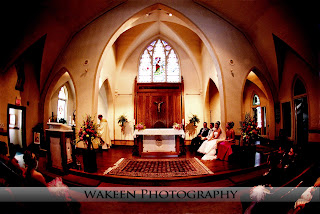 |
| Ready to help you talk photography |
It is no surprise that brides (or grooms) don’t instinctively know what to look
for when deciding who will photograph the most important day of their lives
– their wedding! But if you ask a
photographer, especially one who photographs weddings for a living like we do,
rest assured, you’ll get advice with real value. And guess what? Price is
not THE most important factor. Read on to see why.
Personality
 Believe it or not, this IS the first item of importance to consider because it will
determine how well you’ll connect with your photographer. Unless you’re a
natural performer, it’s not unusual to feel timid or unsure during posed
portraits as opposed to candids. Finding a photographer you can relate to in
personality is THE best way to
overcome this awkwardness.
Believe it or not, this IS the first item of importance to consider because it will
determine how well you’ll connect with your photographer. Unless you’re a
natural performer, it’s not unusual to feel timid or unsure during posed
portraits as opposed to candids. Finding a photographer you can relate to in
personality is THE best way to
overcome this awkwardness.
The couple spends virtually the entire day with their photographer(s), so being
with someone who irritates or makes you feel uncomfortable is going to take
away from the wedding experience. If you don't like your photographer(s), you
won’t feel as calm or as confident as you might otherwise. Having that fun
relationship with your photographer means you’ll be more relaxed in the
photographs you’ll look back on for years to come.
Style
The style of a
photographer is the second most important point to take into consideration.
Have you seen some photos that many others seem to rave over but you’re just
not that crazy about? The reason might not be because the photographer has done
a poor job, but because his/her style is not yours. If you swoon over
soft, light-filled images with lots of sun flare or blown-out backgrounds, then
a photographer who shoots everything using artificial lighting or mostly
indoors is probably not the best fit for you. Always review the photographer's
portfolio to be confident their style of imagery is a match for your wedding
dreams.
Price
Let’s face it – price is an important factor
for most people. Talk it over with your future spouse and set a reasonable
budget. “Reasonable,” however, is a very subjective term, so you’ll need to ask
yourself what aspects of your day are the most important for you, and set your
priorities accordingly. Some couples
agree to compromise on their venue choice, or their food/beverage options, in
order to pay more for the photographer who really “does it” for them. Of course, you should still do your homework
to get an idea of price ranges for your geographical area. Prices might seem
high but remember that your wedding photography (and/or videography) is what
will endure long after the wedding cake is digested and the dress has yellowed
- you don't want to skimp on it! You DO get what you pay for.
Professionalism
Your photographer should be licensed,
insured, and tax-paying; in other words, a true professional! Naturally, you
want to deal with an honest business person who’ll make your day joyously
memorable and free of complications. Look through the contract carefully before
signing to ensure everything is as agreed. Will
the photographer advertised be the one there on your wedding day or do they
send out another photographer in their place? Will they bring an assistant? How
many photos will you get? How many
can be retouched? How long will it
take for the photos to be ready? Do they offer payment plans?
Reviews/References
After narrowing down your options, it is time
to research a photographer’s reputation.
Do a search on Yelp, Google, and Wedding Wire, in addition to checking
out the testimonials on his/her website.
What other brides are saying about your potential wedding photographer does matter. A really good photographer often books the majority of his/her
weddings through positive referrals.
 Experience and Skill
Experience and Skill
Experience speaks to the length of time your photographer has been in business,
but does not always guarantee the best results. Skill speaks to how talented
the photographer is and you’ll have to trust your personal opinion in addition
to any awards he/she may have earned.
In addition to experience and skill with the camera, your photographer
should have the ability to relate well with the other professionals you’ve
hired. He/she must know well the
natural progression of a wedding day, and be able to confidently direct your
guests into combinations of groups for those all-important formal portraits.
Flexibility
Some photographers may refuse to even try
something they normally wouldn't do. You should be careful about working with
such people because it can end up being their vision only instead of yours.
Don't be afraid to ask questions during the consultation.
Second
Shooter/Assistant
Some
photographers never work without an assistant. Some do. It is worth inquiring about. Weddings are notoriously busy with a
multitude of happenings and expressions to capture, so having a second shooter
can be a plus, providing you with optional angles and more depth to the
photographic story being told. Of
course, if your wedding is extremely small, you might ask if you can economize
on the photographer’s offerings by having only one shooter.











